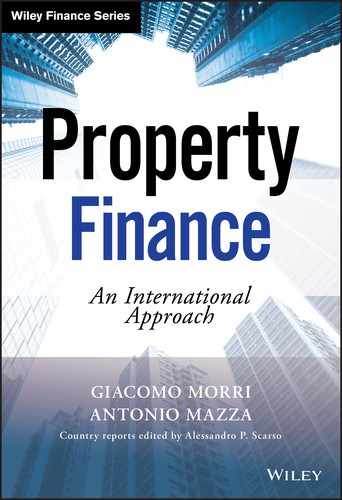Foreword
I'm very honoured to be invited by the authors and by Prof. Alessandro P. Scarso to write a foreword for the thoughtful book Property Finance – An International Approach.
As I had the privilege to be the first reader of this book, I believe it to be the most practical and concise guidebook on property finance. Based on the introduction to the fundamentals of property finance, the authors have explored the cutting edge issues of structured real estate financing, loan agreement, bullet payments, effects of financial leverage on real estate investments, structured real estate financing case studies, hybrid forms of financing, the Basel Accords, and effects on real estate financing. This book has a distinctive feature of question and case orientation.
This book has not followed the writing style of the classic textbook. Quite the contrary – the authors present the legal issues first, and then concentrate on providing feasible legal solutions to complete the property financing transactions from various perspectives. Therefore, this book is very appealing to bankers, lawyers, and business people as well as the students of law schools and business schools, who want to gain a clear picture of the legal system on property finance within a short time.
The devil is in the detail. In addition to offering various tailor-made alternatives to meet the different purposes of property financing transactions, this book has also paid appropriate attention to the legal details, which are easily ignored in commercial practice. For instance, the due diligence process, especially legal due diligence, is carefully elaborated on in this book, as most of the failures of property financing transactions could be traced back to the failure of due diligence.
This book is a reader-friendly work in terms of its useful reader's manual and the selection of some of the major jurisdictions on property finance in the seven country reports. These country reports represent not only the developing countries and the developed countries, but also the civil law system and the common law system. The comparative research on property finance in different jurisdictions is extremely important in the era of globalization, as any transaction of property finance could trigger legal effects on the international participants or on the property located in another jurisdiction. This book has successfully pointed out the key differences of property finance systems in different countries. Of course, the authors also encourage readers to identify the commonalities from the various jurisdictions by offering a uniform questionnaire applicable to the seven jurisdictions.
As a Chinese business law scholar, I'm more than pleased to find that Chinese legal rules on property financing have been introduced very accurately. It is true that China has developed a set of sophisticated principles and institutional arrangements on property financing based on its own market conditions and the best international practices. In addition to the statutes such as the Property Right Law of 2007 and Security Law of 1995, the judicial interpretations of the Chinese Supreme Court have also played significant roles in clarifying the ambiguous legal articles.
Of course, it is an open question whether Chinese law recognizes the independent security. In the answer to Question 3 of the country report of China, it is said that “Chinese law so far still does not acknowledge independent security, meaning any type of security, even after establishment, is dependent on the main debt, i.e. the loan contract”. To my knowledge, Chinese courts do recognize the independent security established in the international business transactions, on the ground of the exceptional sentence in Article 5 of the Chinese Security Law, “A guarantee contract is an accessory contract to a principal contract. If the principal contract is invalid, the guarantee contract shall be invalid. Where the guarantee contract stipulates otherwise, such stipulations shall apply.” In 2013, I was invited to offer legal opinions to the Chinese Supreme Court on the possibility of recognizing the independent security in domestic business transactions in the draft of judicial interpretation on independent security. I strongly support the use of independent security in domestic business transactions.
Last but not least, I'm very grateful for the hard work of the prominent authors. When I have to choose a book among hundreds of competing works on the same topic in the bookstores, I usually pay more attention to the reputation and the background of the authors. Giacomo Morri, Antonio Mazza and, as far as the editing of the country reports is concerned, Alessandro P. Scarso completed this book not only on the basis of many years of teaching and research, but also on the basis of their rich experience in the practice of property finance. As a Chinese legal scholar, I personally have benefited greatly from reading it. I'd like to take this opportunity to encourage Chinese and other international readers to share the valuable knowledge presented here.
Beijing, August 2014
Prof. Dr. Junhai Liu
Director, Business Law Center, Law School, Renmin University of China (RUC)
Vice Chairman, China Consumers' Association
Vice Chairman & Secretary General, China Consumers' Protection Law Society
Panelist, CIETAC, BAC, HKIAC, VIAC, ICDR/AAA, WIPO, KCAB, APRAG, KLRCA
